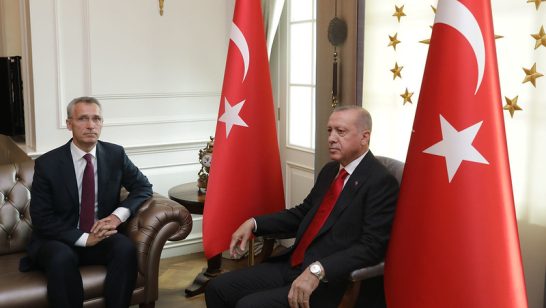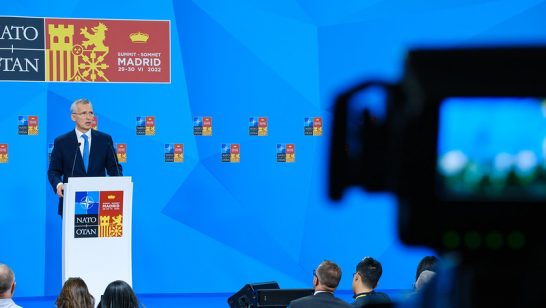
Despite, but perhaps also because of, the new Strategic Concept of the North Atlantic Alliance as agreed to last June by NATO leaders, there seems to be again an urgent need for the Alliance to adapt efficiently both to rapidly changing geo-strategic external conditions, but also to possible functional shortcomings and internally divergent views. Once again, NATO must demonstrate its self-confidence and unity among all its members, paying tribute to its fundamental transatlantic bond. Naturally, it does not end there.
By the end of June, NATO hopes to enlarge with Finland and Sweden once the obstacles posed mainly by a single Ally are overcome. Pressure on all sides will inescapably mount as the weeks pass, and the two candidacies seem to disentangle and follow different paths. By the Vilnius Summit, the Alliance will also need to demonstrate a tangible ‘360 degree’ approach to core challenges emanating from multiple directions and, unfortunately, not solely from a blatantly aggressive Russia.
By the Vilnius Summit, the Alliance will also need to demonstrate a tangible ‘360 degree’ approach to core challenges emanating from multiple directions and, unfortunately, not solely from a blatantly aggressive Russia. Spiros Lampridis
Although it is likely to be too early to draw any definite political or strategic conclusions on the Russian invasion in July, the Alliance should at least be in a position by then to assess many facts and parameters that have broadly determined the evolution of the conflict and NATO’s stance so far. An earnest overview of the entire situation might also set the ground for a realistic and positive framework for the eventual outcome of this horrific clash.
Admittedly, under its current autocratic and revisionist regime, the Russian Federation is still determining whether to contemplate a return to the path of a common, rules-based European security architecture. Nevertheless, the Euro-Atlantic Alliance of democratic nations should not lose sight of the desired peaceful endgame of this ongoing tragedy.
Sadly, a year into the war, a series of tactically devastating but strategically inconclusive battles have led to a precarious standstill between Russia and Ukraine. So far, in which no side can claim a decisive victory – a picture that might not change much from here to Vilnius. However, some initial military “lessons learned” on strategy, tactical operations, and force pre-disposition could prove helpful for NATO leaders to discuss in such a confidential setting. Adjusting the Alliance’s Enhanced Forward Presence units in a credibly deterring but also realistically sustainable way will be of crucial military and economic importance in the near future.
Both individually and in close cooperation with major partners like the European Union, NATO member states must stay the course and substantially and rationally support the unjustly aggressed party economically, militarily, and technologically through the Ukraine Defence Contact Group.
The unfortunate announcement by President Putin of an eventual withdrawal from the “new START” nuclear Treaty only aggravates the negative atmosphere that also prevails in the nuclear field after the demise of the INF Treaty two years ago. NATO leaders will have to address this question, perhaps not only through a Nuclear Planning Group perspective. Yet another delicate question that so far is not up for much of a discussion, avoiding the risk of divisive views among Allies along well-known lines according to geographic proximity and consequent animosity to Russia, is the issue of whether the current crisis is consuming most of the West’s assets and attention, for far too long. For some, it seems dangerous to neglect events and tendencies unfolding in other parts of the broader region or even globally, gradually creating additional challenges to the Alliance.
A year into the war, a series of tactically devastating but strategically inconclusive battles have led to a precarious standstill between Russia and Ukraine. So far, in which no side can claim a decisive victory – a picture that might not change much from here to Vilnius. Spiros Lampridis
Given the upcoming Vilnius Summit, the Alliance might also need to focus on its immediate vicinity, according to concrete pledges it has undertaken through the new Strategic Concept. It is, in fact, clearly stated in that text that all three core tasks remain valid, and so cooperative security and crisis management cannot be ignored or sacrificed and brushed aside, even if due to a justified priority on collective security under pressure on the eastern front.
The “South”, as broad as this definition can be, also presents a number of tangible threats. The situation in the Western Balkans is not spectacularly improving since the momentum of integration of those regions in the Euro-Atlantic structures is somehow lost. More attention, material means, political will and ‘out of the box’ thinking is required to overcome the current impasse. The Vilnius Summit seems the right place and time to deal seriously with this matter, perhaps calling for a respective meeting with the Mediterranean Dialogue countries, at least at the Ministerial level.
Regarding the Middle East and North Africa, the Alliance must demonstrate its creativity to address the dangerously persisting problems in Libya, Lebanon, Syria, Iraq, or the entire Sahel. Otherwise, it risks a substantial regional intrusion by Russian malign factors, like the notorious Wagner group or China’s various state agencies and proxies. ISIS and similar terrorist groups still torment sub-Saharan faltering countries, parts of Syria, Lebanon and possibly Iraq. Libya remains lawless in a lethal limbo, and the entire Sahel area seems open for bands of terrorists and ambitious autocratic rulers to expand their activities. When coupled with persistent extreme climatic conditions and economic failure of most states in the area, this could soon lead to renewed unregulated massive migrant movements towards European nations across the Mediterranean Sea, posing yet another serious security challenge to the Allied and European social infrastructures, Institutions, even western societies per se.
The 49 paragraphs of the Strategic Concept hold its creators accountable to their democratic societies of voters and taxpayers. The citizens of each member state bear the real burden of economising the necessary means to honour increased targets of defence expenditure called for by both NATO and the EU’s new Strategic Compass in times of another economic crisis. If the 360 degrees approach is not faithfully served, many of these societies may fail to see the ultimate purpose of their daily financial and social sacrifices. After all, the moral advantage of our Western world lies in the transparency of all Allied, unanimously adopted decisions and actions.
The opinions articulated above represent the views of the author and do not necessarily reflect the position of the European Leadership Network or all of its members. The ELN’s aim is to encourage debates that will help develop Europe’s capacity to address the pressing foreign, defence, and security policy challenges of our time.
Image Credit: Flikr, NATO



